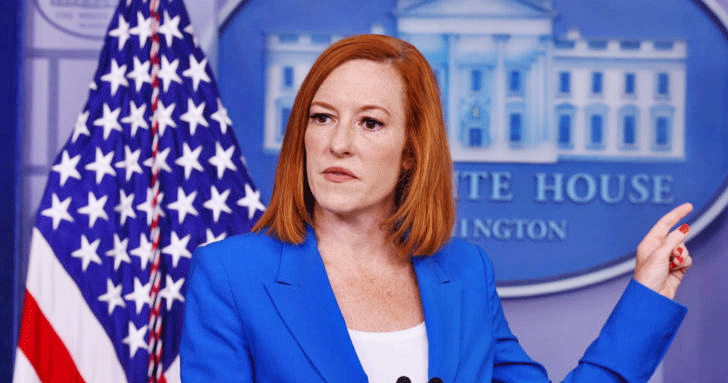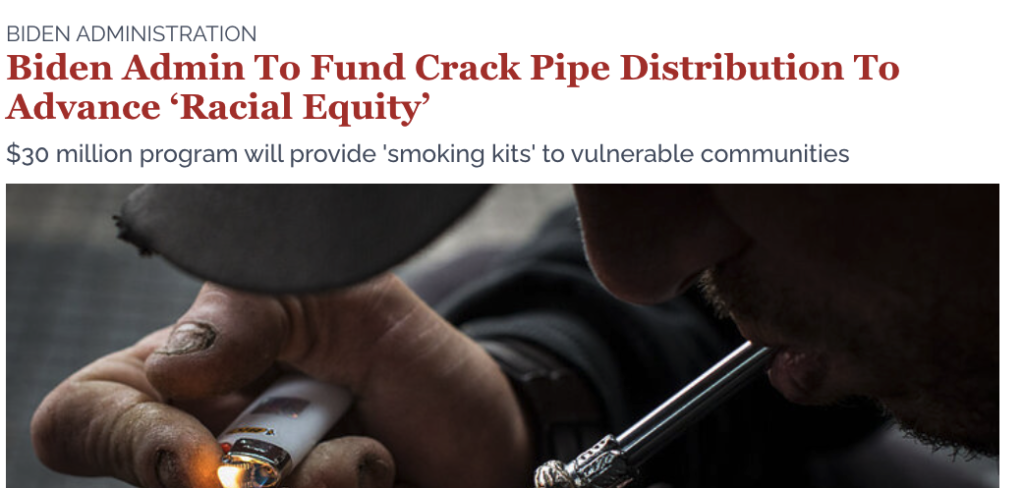Might Know on Facebook Crack Pipe Funny

Factcheck
15:10
Fact-checkers wrongly label 'crack pipe' story false
After a signal from the Biden administration, the censorship machine kicked in
by Park MacDougald

Press Secretary Jen Psaki denounced the Free Beacon's "inaccurate reporting."
Another day, another wave of "misinformation" from those designated to fight it.
On Feb. 7, the Washington Free Beacon published a story with the provocative title "Biden Admin To Fund Crack Pipe Distribution To Advance 'Racial Equity.'" The nub of it was this:
[A] $30 million grant program… will provide funds to nonprofits and local governments to help make drug use safer for addicts. Included in the grant, which is overseen by the Department of Health and Human Services, are funds for "smoking kits/supplies." A spokesman for the agency told the Washington Free Beacon that these kits will provide pipes for users to smoke crack cocaine, crystal methamphetamine, and "any illicit substance."
- Washington Free Beacon
The story also noted that the programme would prioritise "underserved communities," as defined in a Biden executive order from last January — hence the equity angle.
This was not a particularly implausible story. "Safe smoking kit" is a term of art in harm reduction. These kits include clean glass pipes used for smoking crack and meth, as well as other paraphernalia such as mouth guards and filters. An April 2021 story from Annapolis, Maryland, for instance, refers to a city health department programme to distribute "clean crack pipes" to addicts, which was abandoned in the face of backlash from the city's black community. The same article noted that other Maryland needle exchanges offered "safe smoking kits" featuring glass pipes.

The story went viral, much to the annoyance of HHS and the Biden administration. The day after the article was published, a department spokeswoman tweeted , in response to a video by Marco Rubio, that the Free Beacon story was "blatant misinformation." In the current media environment, this was, in effect, a call for the story to be suppressed.
The fact-checkers dutifully fell in line. Snopes rated the story " mostly false " on the grounds that the smoking kits, which could contain crack pipes, were "just one of around 20 components of the grant program." Facebook partner Lead Stories, the organisation behind the fake debunking of an article in the British Medical Journal, released a "hoax alert," which categorically stated the story was "not true." Their reasoning was that the smoking kits were "just a few of the many materials that grantees can utilize."
Although neither of these fact-checks actually debunked the original reporting, they were enough to prompt Facebook to slap a misinformation tag on the article, which directed users attempting to share the story to the Lead Stories fact-check. Jen Psaki appeared later in the day to denounce the Free Beacon 's "inaccurate reporting."
Apparently, however, Health and Human Services Secretary Xavier Becerra considered the reporting accurate enough to issue a press release clarifying that going forward, no pipes would be included in the grant programme. The Drug Policy Alliance responded by releasing a statement lamenting that the government would "no longer" be providing funding for the pipes. Snopes, in response to the government's new guidance, updated its rating from "mostly false" to " outdated ," in the process conceding that the original story was correct.
When I emailed HHS for comment on the accuracy of the story, a spokesperson for the agency provided me with what they claimed was the statement given to the Free Beacon reporter. It referred to "safe smoking kits" but contained no reference to crack and no language about "any illicit substance," which had appeared as a direct quote in the article. The implication was that the reporter had invented this element of the story.
However, when I asked if there had been any other communications between HHS and the reporter, and if it was the agency's position that the reporter had fabricated the quote about "any illicit substance," the spokesperson provided me with the following email exchange between the reporter and an agency employee, which read:
Reporter: Just to confirm, these kits [are] intended to help users reduce risk when smoking crack and meth?
HHS: I wouldn't limit [it] to those two substances. It would reference "any illicit substance."
According to the spokesperson, the story was inaccurate because the reporter had not specifically asked about pipes — merely confirmed funding for "safe smoking kits" that almost always include pipes — and had not included language that funded programmes must comply with federal, state, and local laws. This, at the end of the day, was the "misinformation" that had justified the story's suppression by Facebook.
One expects government flaks, when forced to defend an embarrassing policy, to do as much as they can to mislead the public without technically lying. The problem is when "fact-checkers" and tech giants, rather than acting as neutral arbiters, try to help do this job for them.
Source: https://unherd.com/thepost/fact-checkers-wrongly-label-crack-pipe-story-false/
0 Response to "Might Know on Facebook Crack Pipe Funny"
Postar um comentário